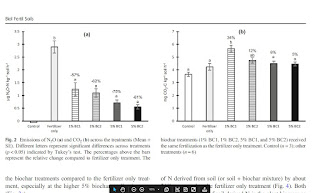As part of our PhD student Subin Kalu's doctoral study, we have just published a in Biology and Fertility of Soils a greenhouse pot experiment to test the effectiveness of two types of wood-based biochars in reducing N leaching, N2O emissions, and plant N uptake. Using 15N tracing technique, we studied the effects of biochars on the fate of added ammonium (15NH4+) and nitrate (15NO3-) fertilizer.
The two types of biochars used were a regular biochar and a Kon-Tiki produced nutrient-enriched biochar at two application rates: 1% and 5%. Kon-Tiki is a conical kiln for producing home-made biochar that follows the principle of flame curtain pyrolysis i.e. even though the feedstock seems to be burnt in an open fire, the flame itself acts as a barrier between feedstock and atmosphere maintaining oxygen-free condition. Right after pyrolysis, the hot Kon-Tiki produced biochar was enriched with a cattle-slurry mixture.
Both the biochars significantly increased plant aboveground biomass by 22–23% at the higher biochar application rate. The biochars significantly reduced NH4+ and NO3- leaching by 21–53% and 47–68%, respectively. Similarly, the biochars significantly suppressed N2O emission by 57–81%. At the higher application rate, the biochars significantly increased plant N uptake by 24%. Interestingly, we found that the biochars increased the plant uptake and soil recovery of added 15NO3- fertilizer.
These results suggest that the biochars were able to retain highly mobile 15NO3- ions in soil by preventing them from leaching and denitrification. Such retained 15NO3- ions were accessible for plants. On the other hand, biochars decreased the plant uptake and soil recovery of added 15NH4+ fertilizer although biochar helped to reduce 15NH4+ leaching. We suspect that added 15NH4+ fertilizer was lost due to biochar induced ammonia volatilization (conversion of NH4+ to NH3). Increased soil pH with biochar justifies our reasoning because high soil pH favors ammonia volatilization.
We also noticed that the significant increase in
the plant biomass due to the addition of the biochars was because of
the enhanced uptake of N derived from the soil. This suggests that the
interactions between biochar and native soil
organic N may be important determinants of the availability of soil N to
plant growth. Read more at


No comments:
Post a Comment